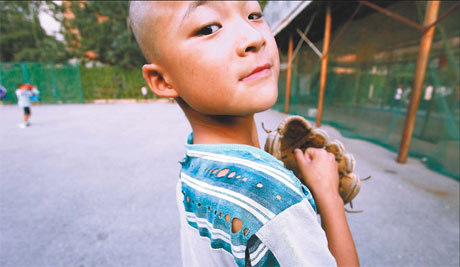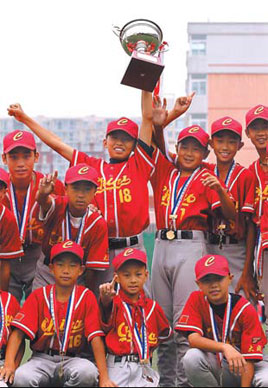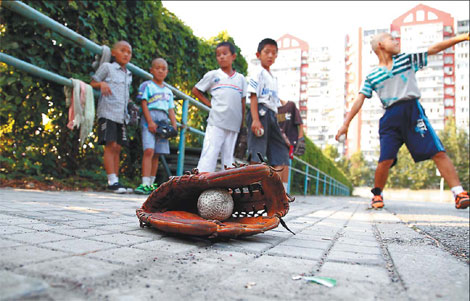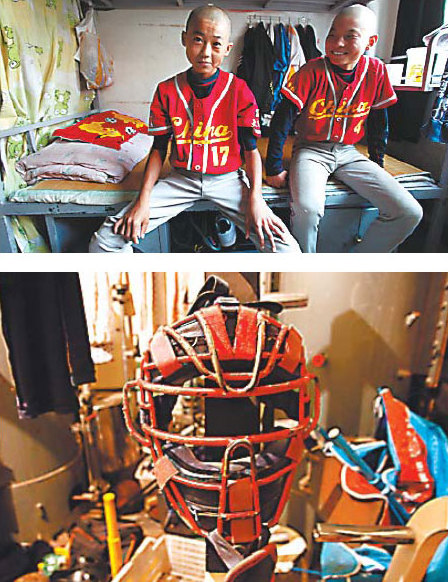Focus
Field of dreams
By Tang Yue (China Daily)
Updated: 2010-09-05 08:13
 |
Large Medium Small |
|
|
Dreams are cocooned in the most unlikely places. The gray low-rise building in the backyard of a school in southwest Beijing is one such incubator. Its walls are yellowed with age and the paint has started peeling. A few meters away, an equally battered signboard is the only indication that this shabby building is any different from the rest of the school complex.
This is the Beijing Xinxing Longren Baseball Club.
It is no ordinary baseball club, and a patient trudge up to a third floor dormitory reveals a wall lined with countless trophies - including one declaring the club champions of last month's 28th Boys Nankyu Baseball World Championships in Japan.
This is the first time China has won the championship in 11 years and the man responsible for this glorious achievement is Li Wei, the coach and owner of the baseball club.
Here in this little room, the coach's desk fights for space with his personal possessions, fruits, food and medicine stocked up for the players' use. Scattered about too, are the club's many prizes and awards.
On the wall of the corridor is a group photo taken after the team won the National Junior Championships a few years ago. A poster documenting the history of the six-year-old club sits next to pinups of Major League Baseball (MLB) stars such as Derek Jeter of the New York Yankees - a proclamation of the young team's big ambitions.
For Yang Yanyong, these dreams were non-existent when he first arrived at the club in 2004. He knew nothing about baseball, let alone its iconic stars in the US.
|
|
When the then 10-year-old was asked to run as fast as he could to a tree in the playground, he did not realize the 50-m dash was the first step toward dignity and dreams.
The man who told Yang to run was Li Wei. He was out talent-spotting players in Hohhot, Inner Mongolia and Yang proved to be the fastest of the lot.
But when Li asked the boy how tall his parents were to try to estimate what the child's height will be when he was fully grown, the young man hung his head. He didn't know.
Yang was an orphan, and he had started lessons at the school just a few days before Li Wei arrived.
"That finally made up my mind about bringing him back to Beijing," Li says. He had decided to give the child a chance to make a career out of baseball and Yang became one of the first three players to be taken under his tutelage.
Li's faith in Yang was not misplaced. After five years training under Li, Yang signed with the Shanghai Eagles in the Chinese Baseball League last year. Although the Eagles finished sixth out of seven in the just-concluded domestic league, the 16-year-old Yang is now a key player on the squad and is expected to play for the national team sooner or later.
"This is totally beyond my imagination. I knew nothing about baseball. I am an orphan and I didn't know I could have a dream," says Yang, now a student in senior high school.
He has set his sights on Major League Baseball and his idol is Ichiro Suzuki, the Japanese player batting for the Seattle Mariners who has already scored a number of records in the league.
As for Li Wei, he is more determined than ever after attending a training session for coaches conducted by MLB in 2007. The course reinforced his beliefs by showing how baseball can change the life of troubled teenagers and he is going all out in his talent quest among orphans and the children of migrant families.
Since then, he has discovered another four orphans - Zhang Xiangyang, Hao Jiaqi and Tibetan boys Bstan 'Dzin and Byams Pa Rig 'Dzin.
They are all under 10. For the rest of the 39 kids in the club, many are from rural areas or from poor migrant workers' families.
Only 11 students pay the full fees of nearly 20,000 yuan ($2900) per year, which includes tuition, board and lodging, training equipment and enrollment at the adjacent Dacheng School, where the players keep up with the usual school curriculum.
But even these payments only meet half the expenses. The rest comes from Li Wei himself, from savings he had hoarded during his years as a businessman and earnings from the stock market, he says. Some parents who are financially able also help. Several air conditioners in the dormitories and a bus for the team's transport were donated, as were some of the flight tickets to Japan last month for the World Championships.
The lack of finances has not deterred those who believe in Li Wei's crusade. The number of coaches has grown from one - Li himself - to five, including volunteer coach Tian Baoliang and Yang Bin, who get 500 yuan a month from the club.
A sports teacher at Dacheng School, Yang works with the team every day for two hours after school and full time during the holidays.
Although the Chinese Baseball Association(CBA) does not offer the club financial aid, it does supply secondhand bats, gloves and balls. Last week, the boys were told they would be getting a pitching machine, first used in Wukesong Stadium during the 2008 Beijing Olympics.
|
|
"This team is unique. Li Wei is so dedicated and the boys work really hard. If there were more people like him, it would be much easier to develop the sport in China," says Shen Wei, the head of the CBA.
For Li, the dream has just begun.
"If conditions allow, I will have more orphans and poverty-stricken children in the club. They have no other choices so they are more determined and they work harder. Unlike children from rich families, they treasure the opportunity to change their own destiny, to build their dreams."
Li Wei had his own dreams. When he took part in the 1985 Boys Nankyu Baseball World Championships in Japan as a catcher and finished second, he never thought he would be leading a team to the winners' podium 25 years later or that he would win the trophy for best coach. But now, he is motivated to aim for the stars.
"MLB is the best league in the world. The Japanese have proven their ability there and I hope my players can also make a difference there one day," he says.
This month, Li will be bringing some of his boys to visit Yankee Stadium (home of the New York Yankees) and let them see their field of dreams in reality - under an exchange program by QSL Sports Management co-organized by Kenneth Huang.
"I believe the visit will encourage them to follow their dreams and I have faith they will make it," Li says.
|
|



